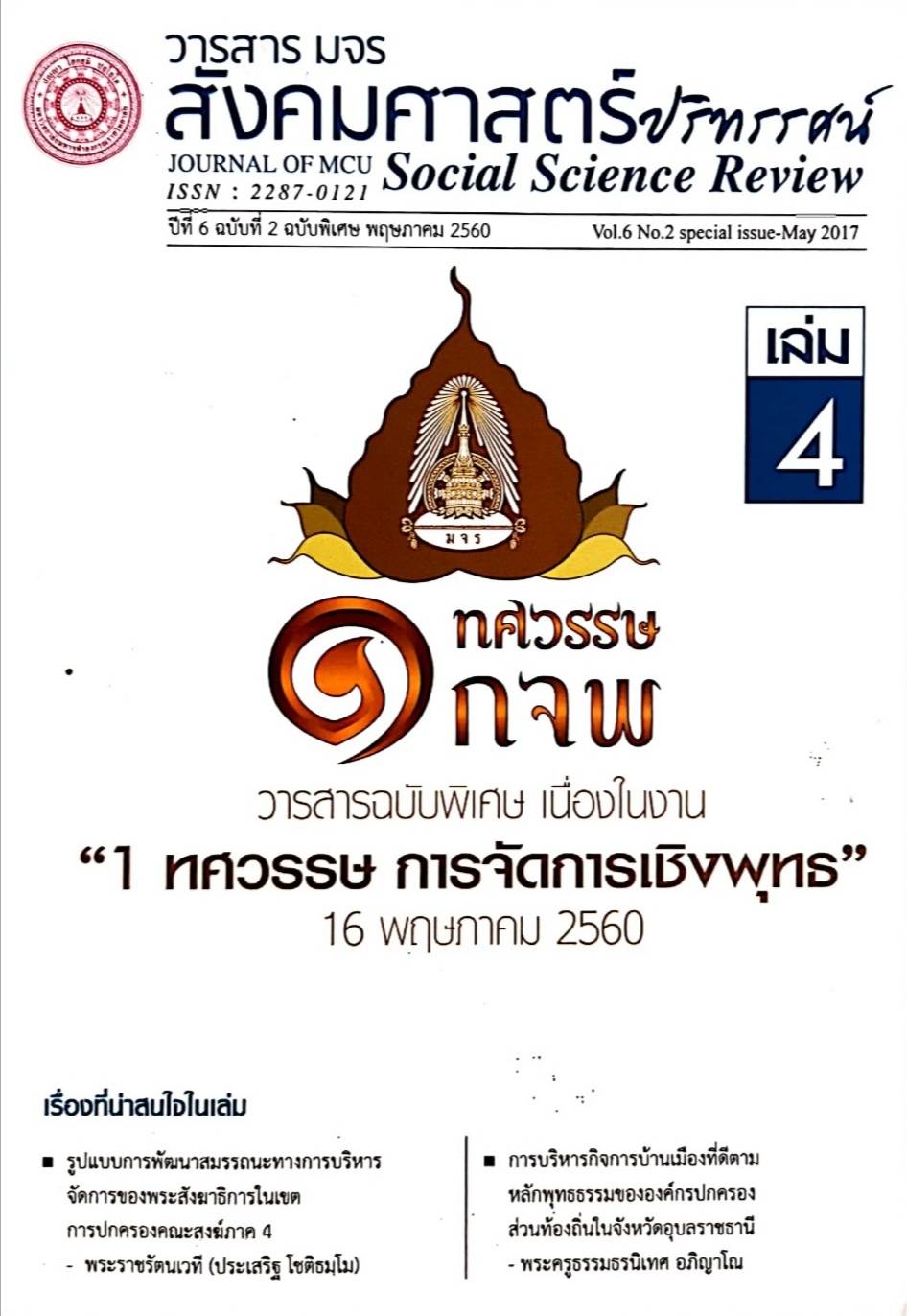การส่งเสริมการจัดการสุขภาวะแบบองค์รวม เพื่อประชาชนขององค์กรปกครองส่วนท้องถิ่นในเขตภาคกลางตอนบน
บทคัดย่อ
การวิจัยนี้มีวัตถุประสงค์เพื่อ 1) ศึกษาการจัดการสุขภาวะแบบองค์รวมของ
ประชาชนในเขตภาคกลางตอนบน 2) ศึกษาหลักพุทธรรมได้แก่อิทธิบาท 4 ที่มีอิทธิพลต่อการ
จัดการสุขภาวะแบบองค์รวมเพื่อประชาชนขององค์กรปกครองส่วนท้องถิ่นภาคกลางตอนบน 3)
และนาเสนอรูปแบบการจัดการสุขภาวะแบบองค์รวมเพื่อประชาชนขององค์กรปกครองส่วน
ท้องถิ่นภาคกลางตอนบน
ระเบียบวิธีวิจัยแบบผสมผสานวิธี ระหว่างการวิจัยเชิงปริมาณและการวิจัยเชิง
คุณภาพ การวิจัยเชิงปริมาณเก็บข้อมูลจากกลุ่มตัวอย่างด้วยแบบสอบถามจานวน 400 คน
วิเคราะห์ข้อมูลด้วยสถิติ คือความถี่ ร้อยละ ค่าเฉลี่ย และส่วนเบี่ยงเบนมาตรฐาน และทดสอบ
สมมติฐานด้วยสถิติ t-test, ANOVA : F - test และ Multiple Regression การวิจัยเชิง
คุณภาพเก็บข้อมูลด้วยแบบสัมภาษณ์เชิงลึกที่มีโครงสร้าง จากผู้ให้ข้อมูลหลัก 26 รูป/คน และ
จากผู้มีส่วนร่วมในการสนทนากลุ่มเฉพาะจานวน 9 รูป/คน วิเคราะห์ข้อมูลด้วยการพรรณนา
ความผลการวิจัยพบว่า
1. การจัดการสุขภาวะเพื่อประชาชนขององค์กรปกครองส่วนท้องถิ่น ภาคกลาง
ตอนบน การจัดการสุขภาวะทางกายอยู่ในระดับมาก (3.58) การจัดการสุขภาวะทางสังคมอยู่ใน
ระดับมาก (3.76) ด้านจิตใจอยู่ในระดับมาก (3.51) การจัดการสุขภาวะทางปัญญาอยู่ในระดับ
มาก (3.58) ส่วนปัจจัยทางด้านอิทธิบาท 4 ด้านฉันทะอยู่ในระดับมาก (3.60) ด้านวิริยะอยู่ใน
ระดับมาก (3.65) ด้านจิตตะอยู่ในระดับมาก (3.77) และด้านวิมังสาอยู่ในระดับมาก (3.64)
สาหรับการจัดการสุขภาวะแบบองค์รวม ด้านการจัดการคนอยู่ในระดับมาก (3.67) ด้านการ
จัดการงบประมาณอยู่ในระดับมาก (3.73) ด้านการจัดการทั่วไปอยู่ในระดับมาก (3.83) ด้าน
อุปกรณ์/เครื่องมืออยู่ในระดับมาก (3.76) ด้านบริการประชาชนอยู่ในระดับมาก (3.65) และ
ด้านคุณธรรมจริยธรรมอยู่ในระดับมาก (3.79)
ผลการวิเคราะห์ค่าสัมประสิทธิ์ถดถอยพหุคูณ ที่ระดับนัยสาคัญที่ 0.01 โดยมีปัจจัย
การจัดการที่มีอิทธิพลต่อสุขภาวะแบบองค์รวมเพื่อประชาชนทั้ง 6 ด้าน ดังนั้น ปัจจัยทางด้าน
การจัดการคน (.104) การจัดการงบประมาณ (.085) การจัดการทั่วไป (.139) การจัดการ
อุปกรณ์/เครื่องมือ (.077) การบริการประชาชน (.079) และด้านคุณธรรมจริยธรรม (.087) มี
อิทธิพลต่อสุขภาวะแบบองค์รวมเพื่อประชาชนขององค์กรปกครองส่วนท้องถิ่น ได้ร้อยละ 69.4
(R=.833, R2 =.69.4) สาหรับปัจจัยทางด้านอิทธิบาท 4 ซึ่งมีด้านฉันทะ (.106) ด้านวิริยะ (.
025) ด้านจิตตะ (.853) และด้านวิมังสา (.125) ฉะนั้น ปัจจัยด้านอิทธิบาท 4 ทั้ง 4 ด้านจึงมี
อิทธิพลต่อสุขภาวะแบบองค์รวมเพื่อประชาชนขององค์กรปกครองส่วนท้องถิ่น กล่าวคือถ้าหาก
ปัจจัยทางด้านอิทธิบาท 4 มีการเปลี่ยนแปลงไปโดยเฉพาะทางด้านจิตตะ จะส่งผลต่อสุขภาวะ
แบบองค์รวมเพื่อประชาชนเปลี่ยนแปลงไป ซึ่งอธิบายได้ร้อยละ 59.9 (R=.774, R2 =.59.9)
โดยรูปแบบด้านสุขภาวะทางกาย (ฉันทะ) องค์กรต้องมีนโยบายการสร้างจิตสานึกให้กับ
บุคลากรเพื่อการดูแลสุขภาวะของประชาชน สนับสนุนงบประมาณในการดูแลสุขภาวะของ
ประชาชนอย่างเต็มที่ โครงการและกิจกรรมต่างๆ ของหน่วยงานสามารถบริการประชาชนด้าน
สุขภาวะอย่างเพียงพอต่อความต้องการ การจัดหาอุปกรณ์/เครื่องมือสมัยใหม่มาปรับใช้เพื่อการ
จัดการสุขภาวะของประชาชนอย่างต่อเนื่อง มีการจัดหาอุปกรณ์/เครื่องมือสมัยใหม่มาปรับใช้
เพื่อการจัดการสุขภาวะของประชาชนอย่างต่อเนื่อง ให้กาลังใจแก่บุคลากรและประชาชนต่อ
การดาเนินด้านสุขภาวะอย่างมาก หน่วยงานมีการจัดการระบบกลไกต่างๆ เพื่อรองรับงานด้าน
สุขภาวะของประชาชนอย่างเต็มที่ซึ่งจะนามาสู่การเกิดวิริยะ รูปแบบด้านสุขภาวะทางจิตใจ (จิต
ตะ) รูปแบบการดูแลสุขภาวะทางกายแบบองค์รวมเพื่อประชาชนขององค์กรปกครองส่วน
ท้องถิ่นภาคกลางตอนบนตามหลักจิตตะในที่นี้หมายถึง แผนงาน/โครงการที่เกี่ยวข้องกับการ
ดูแลสุขภาวะโดยบุคลากรทางสาธารณสุข พร้อมสร้างขวัญและกาลังใจการแนะนาพบจิตแพทย์
และส่งเสริมด้านธรรมะจัดกิจกรรมทางด้านพระพุทธศาสนา มีการจัดโครงการหมู่บ้านรักษาศีล
5 ในครอบครัวมีโครงการสร้างผู้นาในชุมชน เป็นผู้นาในการทากิจกรรมต่างๆ เน้นให้ผู้เข้าร่วม
กิจกรรมมีความสุข ส่งเสริมอาสาสมัครเยี่ยมผู้ปุวยดูแลสุขภาวะทางด้านจิตใจ มีโครงการพัฒนา
คุณภาพชีวิตของผู้สูงอายุ จัดกิจกรรมรวมกลุ่มสวดมนต์ไหว้พระ ฝึกสมาธิ นิมนต์พระมา
บรรยายธรรม และทาความเข้าใจเกี่ยวกับคาสอนทางพระพุทธศาสนารูปแบบด้านสุขภาวะทาง
สังคม (วิริยะ) บุคลากรมีความขยันหมั่นเพียรในการทางานด้านสุขภาวะ มีงบประมาณมีผลที่
สาคัญอย่างมากที่จะทาให้การดาเนินด้านสุขภาวะประสบผลสาเร็จ มีการส่งเสริมระบบการ
บริการด้วยวิธีการเข้าใจบริบทในวิถีชีวิตของประชาชน นาอุปกรณ์/เครื่องมือไปใช้ได้อย่างเต็ม
สมรรถนะ และคุ้มค่ามีประสิทธิภาพต่อการลงทุน ผู้บริหารองค์กรมีความพยายามในการให้
กาลังใจ ดูแลสวัสดิการแก่บุคลากรและประชาชนเพื่อการจัดการสุขภาวะและมีแผนยุทธศาสตร์
การพัฒนาสุขภาวะในพื้นที่เปูาหมายอย่างชัดเจนรูปแบบด้านสุขภาวะทางปัญญา (วิมังสา)
บุคลากรมีความสามารถในการแก้ไขปัญหาเฉพาะด้านสุขภาวะได้ดี จัดหางบประมาณจาก
ภายนอกได้เสมอในกรณีที่งบประมาณไม่เพียงพอ มีวิธีการใหม่ๆ เพื่อการบริการประชาชนให้
ครอบคลุมทุกพื้นที่เปูาหมาย บุคลากรมีความเข้าใจในการดูแล รักษาอุปกรณ์/เครื่องมืออย่าง
ถูกต้อง และเหมาะสม มีแนวทางในการให้กาลังใจที่หลากหลายรูปแบบต่อบุคลากรที่ดาเนินงาน
ด้านสุขภาวะได้ตามเปูาหมายที่วางไว้ และจัดการด้านสุขภาวะเพื่อประชาชนอย่างมี
ประสิทธิภาพและยั่งยืนตลอดไป
เอกสารอ้างอิง
People Of The Upper Central Region. Dissertation Graduate School :
Mahachulalongkornrajavathayalaya University.
Suwat Inpraphai. (2557). Study The Holistic Well-Being Administration For
People Of The Upper Central Region, Dissertation Graduate School :
Mahachulalongkornrajavathayalaya University.
Kittiyaphorn Choksawatphinyo. (2553). Study Social Development Quality Of Live
Of HIV People For People Of The Upper Central Region, Dissertation
Graduate School : Mahachulalongkornrajavathayalaya University.
Somboon Thammalangkar. (2554). Study The Holistic Well-Being Administration
For People Of The Upper Central Region, Dissertation Graduate School :
Mahachulalongkornrajavathayalaya University.
ดาวน์โหลด
เผยแพร่แล้ว
รูปแบบการอ้างอิง
ฉบับ
ประเภทบทความ
สัญญาอนุญาต
ลิขสิทธิ์ (c) 2020 วารสาร มจร สังคมศาสตร์ปริทรรศน์

อนุญาตภายใต้เงื่อนไข Creative Commons Attribution-NonCommercial-NoDerivatives 4.0 International License.
เพื่อให้เป็นไปตามกฎหมายลิขสิทธิ์ ผู้นิพนธ์ทุกท่านต้องลงลายมือชื่อในแบบฟอร์มใบมอบลิขสิทธิ์บทความให้แก่วารสารฯ พร้อมกับบทความต้นฉบับที่ได้แก้ไขครั้งสุดท้าย นอกจากนี้ ผู้นิพนธ์ทุกท่านต้องยืนยันว่าบทความต้นฉบับที่ส่งมาตีพิมพ์นั้น ได้ส่งมาตีพิมพ์เฉพาะในวารสาร มจร สังคมศาสตร์ปริทรรศน์ เพียงแห่งเดียวเท่านั้น หากมีการใช้ภาพหรือตารางหรือเนื้อหาอื่นๆ ของผู้นิพนธ์อื่นที่ปรากฏในสิ่งตีพิมพ์อื่นมาแล้ว ผู้นิพนธ์ต้องขออนุญาตเจ้าของลิขสิทธิ์ก่อน พร้อมทั้งแสดงหนังสือที่ได้รับการยินยอมต่อบรรณาธิการ ก่อนที่บทความจะได้รับการตีพิมพ์ หากไม่เป็นไปตามข้อกำหนดเบื้องต้น ทางวารสารจะถอดบทความของท่านออกโดยไม่มีข้อยกเว้นใดๆ ทั้งสิ้น





